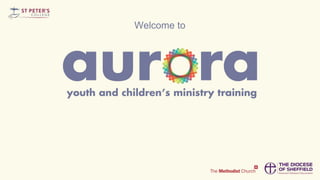Aurora 21 Oct 2020 - Educational
- 1. Welcome to
- 2. Formal education: the hierarchically structured, chronologically graded ‘education system’, running from primary school through the university… Coombs, P. with Ahmed, M. (1974) Attacking Rural Poverty, Baltimore: The John Hopkins University Press. formal Education 1b Values of Youth Ministry
- 3. Informal education, we argue, is driven by conversation and being with others. It develops through spending time with people – sharing in their lives – and listening and talking. http://infed.org/mobi/what-is-informal-education/ 1b Values of Youth Ministry Informal Education
- 4. What does it look like? ‘Going with the flow’ opens up all sorts of possibilities for us as educators. On one hand we may not be prepared for what comes, on the other we may get into rewarding areas. http://infed.org/mobi/what-is-informal-education 1b Values of Youth Ministry Informal Education
- 5. Such conversations and activities can take place anywhere and at any time. This contrasts with formal education which tends to take place in special settings such as schools. http://infed.org/mobi/what-is-informal-education 1b Values of Youth Ministry Informal Education
- 6. http://performancexdesign.wordpress.com/2009/04/09/leveraging-the-full-learning- continuum/ Time Performance Performance Standard Formal Learning Informal Learning 1b Values of Youth Ministry Informal Education
- 7. FAITH What is it? What is it good for? Hebrews 11: 1. Now faith is confidence in what we hope for and assurance about what we do not see. Faith is trust, assurance and confidence in God. Living faith is shown by service and obedience to God. God will increase our faith if we fervently ask and draw close to Him. By Jim Haeffele Faith - dictionary noun 1. confidence or trust in a person or thing: faith in another's ability. 2. belief that is not based on proof: He had faith that the hypothesis would be substantiated by fact. 3. belief in God or in the doctrines or teachings of religion: the firm faith of the Pilgrims. 4. belief in anything, as a code of ethics, standards of merit, etc. 5. a system of religious belief: the Christian faith; the Jewish faith. 6. the obligation of loyalty or fidelity to a person, promise, engagement, etc.: Failure to appear would be breaking faith. 7. the observance of this obligation; fidelity to one's promise, oath, allegiance, etc. 8. Christian Theology, the trust in God and in His promises as made through Christ and the Scriptures by which humans are justified or saved. formal Education 1b Values of Youth Ministry
- 8. FAITH What is it? What is it good for? Go for a walk and share stories of faith. Where and when has your faith helped you? Who do you know that has strong faith? When has your faith been weak? Listen and learn from others… …you might not learn the definitions of Informal Education 1b Values of Youth Ministry
- 9. Formal Being told the answers Or Informal Finding things out yourself Formal Memory exercise (can be short-term learning) Or Informal Memorable experience (can be long-term learning) 1b Values of Youth Ministry
- 11. • work for the well-being of all • respect the unique value and dignity of each human being • dialogue • equality and justice • democracy and the active involvement of people in the issues that affect their lives (Jeffs and Smith 2005: 95-6) http://infed.org/mobi/what-is-informal-education 1b Values of Youth Ministry VALUES OF INFORMAL EDUCATION
- 12. Ideas? What activities would you call either ‘informal’ or ‘formal’? 1b Values of Youth Ministry
- 13. • What do you use most? Formal, or informal education? • Informal education takes longer, and might have different results to what you think or want. • Think about the difference between a spoken sermon and an all-age service. • 2 Corinthians 3: 7-9. Difference between the written law and the ministry of the Spirit. (How much more glorious!) 1b Values of Youth Ministry













